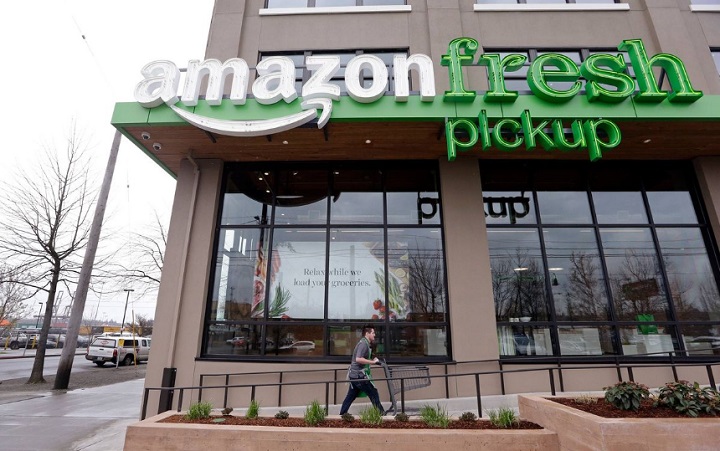Many brick and mortar stores are trying to add online configuration. However, with confirmation on Friday, e-commerce force Amazon.com (NASDAQ:$AMZN) will be doing the exact opposite through their acquisition of Whole Foods Market (NASDAQ:$WFM). If the deal is approved by shareholders and governing regulatory committees associated, Whole Foods will be acquired by Amazon for a whopping $13.7 billion. This shows Amazon’s strong interest in the brick-and-mortar retail sector as their second largest acquisition came in at only $1 Billion.
To no surprise, the announcement of Amazon’s plan for Whole Food’s acquisition has placed immense pressure on supermarket peers. This is a good time to note that Amazon already has a grocery delivery service called AmazonFresh. With the addition of Whole Foods locations, traditional grocers must not only compete with Amazon’s massive purchasing power and lower prices, but convenience as well.
Adding a presence of 456 brick and mortar locations across North America and Britain, the acquisition of Whole Foods allow Amazon to compete with chains such as Kroger Co (KR.N) and Albertsons LLC, as delivery capabilities gain users.
In the words of Mickey Chadha, Vice President of Moody Investors Service, “Supermarkets will now have to contend with not only competition with each other and non-traditional grocers like Wal-Mart Stores Inc (NYSE:$WMT) and Target Corp (NYSE:$TGT), but with a retailer like Amazon which has the financial capacity to price aggressively… We expect this transaction to further accelerate the consolidation within the supermarket space.”
At a 27% premium on Thursday closing prices, Amazon has agreed to pay $42 for each Whole Foods share. With the deal expected to be completed during the second half of 2017, investors have already priced the deal into Whole Food’s share price as it currently since around that level.
With fear of pressure from Amazon, investors have responded as Kroger (NYSE:$KR) shares have dropped 14% to $21.13, their lowest level in the past three years. This trend is consistent across the industry as retail and grocery related companies such as Target (NYSE:$TGT) and Wal-Mart (NYSE:$WMT) also saw their shares fall. However, Amazon shares are up about 3 percent, showing investor confidence in their acquisition.
Prior to the announcement of Friday’s deal, activist hedge fund Jana Partners LLC had also been pushing for the overhaul of its board of directors.
As Neil Saunders, managing director of GlobalData Retail in New York adds, “I think that this takes all of the pressure off Whole Foods and gives Whole Foods the opportunity to revitalize that business and, of course, it stems the criticism from all of these activist investors.”
With the exclusion of debt, the deal would be valued at 13.39 billion. For Whole Foods, this would imply a TTM (trailing twelve month) price to earnings ratio of 31 times (keep in mind this is after the premium), against the average of 14.4 times observed by the S&P 500 Food Retail index (SPLRCRETF).
Why Brick And Mortar Locations?
Jeff Bezos, a former hedge fund manager, started Amazon in Seattle in 1994, and has since grown the company to a market cap of $472 Billion. With offerings ranging from online shopping and enterprise computing, to e-books and entertainment media, Amazon boasts very diverse streams of revenue.
However, it is clear that this acquisition was Amazon’s way of expanding its grocery delivery program AmazonFresh in a much shorter timespan. These new
initiatives, such as their pilot launch of AmazonFresh Pickup, allows shoppers to order online and have their groceries deliver, changing the way consumers shop for groceries. With potential to incorporate Amazon’s prime membership, this could be a consumer lockdown for Amazon’s services.
Amazon was advised by Goldman Sachs Group Inc (NYSE:$GS) and Bank of America Corp (NYSE:$BAC), while Whole Foods was advised by Evercore Partners (NYSE:$EVR).
Featured Image: twitter










